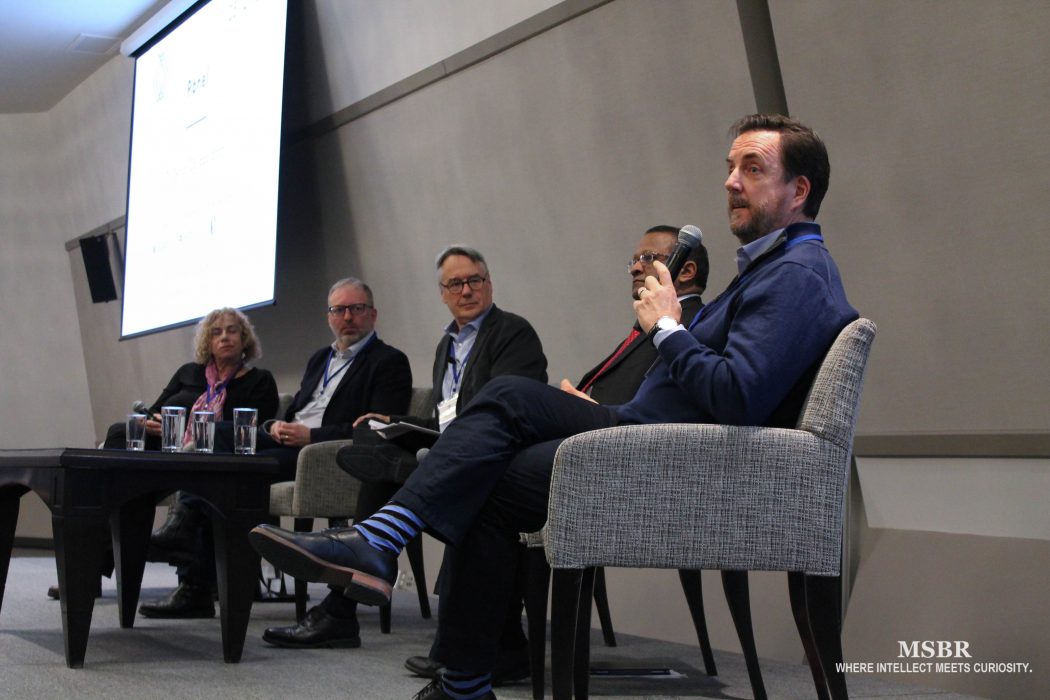After a 2-year hiatus, the Desautels Sustainability Network hosted the Desautels Business Conference on Sustainability (DBCS) on the 25th of January 2019. Created in 2003, DBCS is one of the largest student-led conferences in Montreal, covering hard-pressing issues and topics regarding sustainability in the business world. Professors, local experts, and non-governmental organizations were asked to discuss the possible tools that could help get us one-step closer to a more sustainable future.
Taking an interdisciplinary approach, the conference covered topics ranging from CleanTech to social entrepreneurship, tied together by the overarching theme, “From Threat to Opportunity.” The idea was further extrapolated with talks covering the Tri-Sector, Corporations as Leaders, Individuals as Leaders, and New Technologies.
The Tri-Sector: A Systemic Approach
Various academics and experts from local companies pondered the possibility of aligning strategies between the Tri-Sector: the public, private and plural. To elucidate this point, Dror Etzion, Professor of sustainability and management at McGill and Saku Mantere, Professor of strategy and organization, discussed their paper, “Worldly Strategy for the Global Climate.” The paper highlights the importance of joint teamwork in the Tri-Sector when it comes to dealing with climate change. Etzion and Mantere underscored the importance of collaboration with regards to sustainability. They went on to dissect the tri-sector and their roles. The role of the government is to make rules and indicate to corporations where they need to be. The plural sector is, “there for whatever purpose they were created to be.” In other words, it is neither owned by the state or private investors – McGill, for example, is part of the plural sector. Finally, the private sector was created to mobilize capital by giving shareholders rights. Each sector is created for an exclusive purpose, they adopt have differing strategies; the lack of overlap results in extreme disorganization. According to Mantere and Etzion, a collaborative strategy must be held in order to integrate sustainability systemically.
…the lack of overlap results in extreme disorganization
Individuals as Leaders: Social Entrepreneurship
In her presentation on the importance of female empowerment in third-world countries, Jennifer Lonergan, founder and executive director of Artistri Sud, carefully highlights how businesses can be harnessed for social good. Artistri Sud is a non-profit organization founded in 2009 that helps women in developing countries create sustainable lives. The organization works with women who have an existing ‘skillset’ and explore how they can build and leverage those skills for income. The program is an intensive 5-day retreat that teaches women how to analyse markets, prioritize, and evaluate opportunities. Given the fast-changing world, these tools put women in a position to figure things out on their own – the key to sustainability. Lonergan points out that through female empowerment and education, we can achieve a much more sustainable future. This is mainly due to the “multiplier effect,” whereby an increase in female education leads to a much greater result as it is associated with a reduction in infant mortality, HIV, and increases in GDP. Lonergan underlines that although the nature of business is not to be a force for good, it brings an approach that is about achieving clear outcomes. As a result, both charities and businesses should learn from each other in the hopes of creating a sustainable future.
…an increase in female education leads to a much greater result as it is associated with a reduction in infant mortality, HIV, and increases in GDP.
New Technologies: Expanding Horizons
To wrap up the panel, Sean Brownlee, a partner at the Business Development Bank of Canada (BDC), highlighted the importance of CleanTech. CleanTech refers to any product that reduces any harms done to the environment through sustainable use of resources and improvement in energy efficiency. Brownlee claims that he is trying to push the bounds of what CleanTech is and that even if making profit is a goal, it is still promoting sustainability. With an increase in the development of Artificial Intelligence (AI), we are beginning to see more integration between AI and CleanTech. For example, a leading storage company, called Stem, has announced the AI-powered battery storage system, ‘Athena,’ which claims to optimize the timing of energy use, thereby increasing efficiency. This has already been introduced to five states across the US. As Brownlee puts it, “we are at a much better place in the industry in terms of understanding how to best use CleanTech.”
With an increase in the development of Artificial Intelligence (AI), we are beginning to see more integration between AI and CleanTech.
The topic of sustainability is increasingly important and a conversation that we should all take a vested interest in. Whether it be government, social entrepreneurship, or technology the DBCS conference attempts to adhere to individual interests to increase their audience, while maintaining sustainability at the foundation of all conversations – an effort that will bring more voices, and eventually ideas, to the table.








